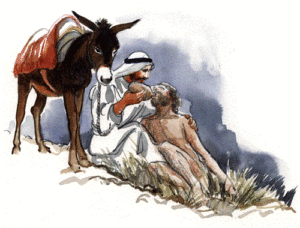
Lesson 7
Love your Neighbor
The Pharisees were a religious group of people who followed not only the written laws of the Old Testament, but also the oral laws. The oral laws consisted of the teachings of the prophets and the traditions of the Jewish people. Like the scribes, the Pharisees were experts in the laws of the Old Testament. In the Gospels, they often tried to test Jesus’ knowledge of the law by asking Him questions. They hoped that His answers would prove that He misinterpreted God’s law.
One day, the Pharisees gathered together, and one of them, a scholar of the law, tested Jesus by asking, “Teacher, what must I do to inherit eternal life?” Jesus said to him, “What is written in the law? How do you read it?” He said in reply, “You shall love the Lord, your God, with all your heart, with all your being, with all your strength, and with all your mind, and your neighbor as yourself.” Jesus said to him, “You have answered correctly; do this and you will live.” But because he wished to justify himself, he said to Jesus, “And who is my neighbor?” (read Luke 10:25-29)
Then, Jesus taught them the parable of the Good Samaritan (read Luke 10:30-35):
A man fell victim to robbers as he went down from Jerusalem to Jericho. They stripped and beat him and went off leaving him half-dead. A priest happened to be going down that road, but when he saw him, he passed by on the opposite side. Likewise a Levite came to the place, and when he saw him, he passed by on the opposite side. But a Samaritan traveler who came upon him was moved with compassion at the sight. He approached the victim, poured oil and wine over his wounds and bandaged them. Then he lifted him up on his own animal, took him to an inn and cared for him. The next day he took out two silver coins and gave them to the innkeeper with the instruction, ‘Take care of him. If you spend more than what I have given you, I shall repay you on my way back.’
Jesus asked the scholar of the law: “Which of these three, in your opinion, was neighbor to the robbers’ victim?” He answered, “The one who treated him with mercy.” Jesus said to him, “Go and do likewise.” (read Luke 10:36-37)
When the Samaritan saw the beaten man on the road, he was moved with compassion and he did what he could to help the helpless man. The Samaritan did not expect any recognition or reward for helping the beaten man. In the same way, we should help others without expecting personal gain.
Who is my neighbor? Based on the parable, a neighbor is someone who stops and helps anyone who is in genuine need for help, regardless of their race, religion or culture. At the same time, anyone who is in genuine need of help is also our neighbor. The Gospels tell us that Jews and Samaritans did not get along, and they tried to avoid one another. For that reason, the Samaritan would have been an unlikely “neighbor” to the beaten man on the road, who was presumably a Jew. The parable teaches us that love and compassion for our neighbor transcends human differences. The commandments to love God and to love our neighbor ought to be based on love.
Questions:
- Who were the Pharisees?
- Three persons passed by the helpless man on the road. Who were they and what did each of them do?
- Based on the parable, what does a “neighbor” mean?
- True or False. We should expect something in return for helping others.
- True or False. The commandments to love God and to love our neighbor should be based on love.